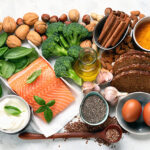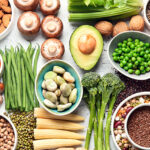PERSPECTIVES WITH DR ALAN BARCLAY
B12: THE COMPLEX VITAMIN Vitamin B12, or cobalamin, is the largest and most structurally complex of all of the vitamins. It’s essential for the development of red blood cells, normal growth, and nervous system maintenance. Our primary sources are animal products (meats, dairy, poultry, eggs and seafood) because it is only synthesized by microorganisms (bacteria …
PERSPECTIVES WITH DR ALAN BARCLAY
FATS AND BLOOD CHOLESTEROL As well as being a highly concentrated source of energy and a carrier for fat-soluble vitamins, fats provide food with a pleasant mouth feel and carry many of the flavours that make certain dishes taste delicious. Current dietary guidelines advise people to eat less saturated fat to help improve blood cholesterol …
PERSPECTIVES WITH DR ALAN BARCLAY
SWEET NOTHINGS? Consumer demand for reduced sugar, no-added-sugar and sugar free foods and beverages has increased, as people look to cut back on processed foods with added sugars without cutting sweet treats out of their lives. Sugar alcohols or polyols are increasingly replacing them in foods and beverages, often along with intense sweeteners, as they …
PERSPECTIVES WITH DR ALAN BARCLAY
HOT POTATOES While they are a pariah in many parts of the developed world, due to the current popularity of low carbohydrate diets, potatoes have been eaten and enjoyed all over the world for centuries. Even today, roots and tubers are the third largest carbohydrate-containing food source in the world, with potatoes representing nearly half …
PERSPECTIVES WITH DR ALAN BARCLAY
DOES THE MICROBIOME AFFECT THE RISK OF DEVELOPING TYPE 1 DIABETES? The number of people developing type 1 diabetes has increased significantly all around the world since World War II, but incidence rates (number of new cases in a year) vary amongst regions. It is most common in Northern Europe, with Finland having the highest …
PERSPECTIVES WITH DR ALAN BARCLAY
FABULOUS FIBRES Most of us know that dietary fibre is good for our health and wellbeing. Many of the health benefits we obtain from consuming dietary fibre occurs when dietary fibres pass through to our large bowel (intestine), and are digested by the trillions of microorganisms that form our microbiome, converting the indigestible carbohydrate in …
PERSPECTIVES WITH DR ALAN BARCLAY
CAN FRUIT BE PART OF A HEALTHY DIET TODAY? Dietary guidelines since Day One back in the late 1970s have recommended that we eat fruit every day for our health and wellbeing. We have plenty of choice to meet that target – not only are there hundreds of different kinds of fruit but, in many …
PERSPECTIVES WITH DR ALAN BARCLAY
SHOULD YOU BE EATING THAT, IT’S FULL OF SUGAR? Honey is classified as a free sugar by the World Health Organisation: “Free sugars include monosaccharides and disaccharides added to foods and beverages by the manufacturer, cook or consumer, and sugars naturally present in honey, syrups, fruit juices and fruit juice concentrates. This is because, like …
PERSPECTIVES WITH DR ALAN BARCLAY
DIETS: LET’S BREAK THE 50-YEAR FAD CYCLE Overweight and obesity is a global phenomenon, with the World Health Organisation estimating in 2016, that 1,900 million adults and 380 million children have a body mass index (BMI) greater than 25 kg/m2. The causes are multifaceted and complex. In 2007, the Foresight Programme of the UK Government …
PERSPECTIVES WITH DR ALAN BARCLAY
IODINE AND THE THYROID GLAND Iodine was one of the first trace-minerals to be identified as an essential nutrient. Nearly 5000 years ago, Chinese physicians treated goitre (enlarged thyroid gland in the neck) by feeding seaweed, seafood extracts and burnt sponge – we now know that these are all rich sources of iodine. In 1811, …




